The one piece of advice that all successful UPSC candidates dispense with is – ‘solve as many previous year question papers as possible’. Dhivya Loganathan is a 2015 batch IAS officer who managed to clear the examination in her third attempt endorses this saying, “The more papers you solve, the better understanding you are able to develop. That way you also start to notice patterns and topics that are often repeated.”
While the topics remain broadly the same, what changes is how the question is put forth. Therefore, working on question papers from multiple years will give aspirants a good understanding of how questions can be framed.
Here are five such topics that are often repeated in the UPSC papers.

Legislations
There are a number of new acts that are passed by the Parliament, some bills that are presented to the house for deliberation, and a few recommendation reports as well. Year after year, questions relating to provisions of popular acts, or about the pending bills are asked to aspirants.
Aspirants could look at staying updated about all such legislations and one place to find all legislations, bills and recommendation reports is the PRS Legislative Research online portal.
Indian Freedom Struggle
Questions relating to India’s freedom struggle, particularly between 1930 to 1947 are often asked in the UPSC examination. The focus usually is on freedom movements like Quit India, Non-Cooperation, Salt Satyagraha, amongst others. It is also important to focus on the various treaties and constitutional advancements that were made during this period. Indian Council Act, 1909; Government of India Act, 1919; Simon Commission, etc. are a few examples of what needs to be studied.
NCERT (National Council of Educational Research and Training) textbooks and Indian Freedom Struggle by Bipin Chandra are resources aspirants could use for this section.
International treaties and conventions
Aspirants must have a good understanding of the various treaties and conventions that India has been a part of, beginning with RAMSAR Conventions on Wetlands in 1971 to the more recent conventions. Questions related to major global groups like the United Nations Security Council (UNSC), World Trade Organisation (WTO), World Bank, etc. are also asked often.
An example of a question on an international convention asked in the 2019 UPSC Prelims paper is as follows:
Consider the following statements:
- Under RAMSAR Convention, it is mandatory on the part of the Government of India to protect and conserve all the wetlands in the territory of India.
- The Wetlands (Conservation and Management) Rules, 2010 were framed by the Government of India based on the recommendations of the RAMSAR Convention.
- The Wetlands (Conservation and Management) Rules, 2010 also encompass the drainage area or catchment regions of the wetlands as determined by the authority.
Which of the statements given above is/are correct?
(a) 1 and 2 only
(b) 2 and 3 only
(c) 3 only
(d) 1, 2 and 3
The answer to this being (c) 3 only.
Monuments and cultural sites of India
India has 38 world heritage sites that include 30 cultural properties, seven natural properties and one mixed site. It is imperative for aspirants to know details about these sites. Questions can range from who built a particular monument to the year in which it was built, or even the civilisation during which it was constructed. Aspirants must have a rounded knowledge on these matters.
An example of a question is as follows:
Who constructed Moti Masjid in Red Fort (Delhi)?
A. Aurangzeb
B. Shahjahan
C. Abkar
D. Bahadur Shah Jafar
The answer to this is A. Aurangzeb.
Geography
The focus while studying for this topic should be on learning about the various major river systems and their tributaries. Focus must be placed on how rivers impact the agricultural sector. The major trade routes and main industrial centres passing through the mountain passes are also equally important.
Ketan Garg, who secured an All India Rank of 93 in the Civil Service Examination 2017 shares the following resources for geography.
Geography (Physical)
NCERT books of grades 11-12
G C Leong’s book
Rajtanil Ma’am’s lectures available on YouTube
Geography (India)
NCERT books of grades 11-12
Rajtanil’s lectures on YouTube
Geography (World)
NCERT books of grades 11-12
K Siddhartha’s book on mapping
Rajtanil’s lectures on YouTube
If you are preparing for the UPSC examination, do check out some of the tips on how to make great time-saving notes by IAS Shashank Mani Tripathi, who secured an All India Rank of 73 in CSE 2015, here.
(Edited by Yoshita Rao)
If you found our stories insightful, informative, or even just enjoyable, we invite you to consider making a voluntary payment to support the work we do at The Better India. Your contribution helps us continue producing quality content that educates, inspires, and drives positive change.
Choose one of the payment options below for your contribution-
By paying for the stories you value, you directly contribute to sustaining our efforts focused on making a difference in the world. Together, let's ensure that impactful stories continue to be told and shared, enriching lives and communities alike.
Thank you for your support. Here are some frequently asked questions you might find helpful to know why you are contributing?

